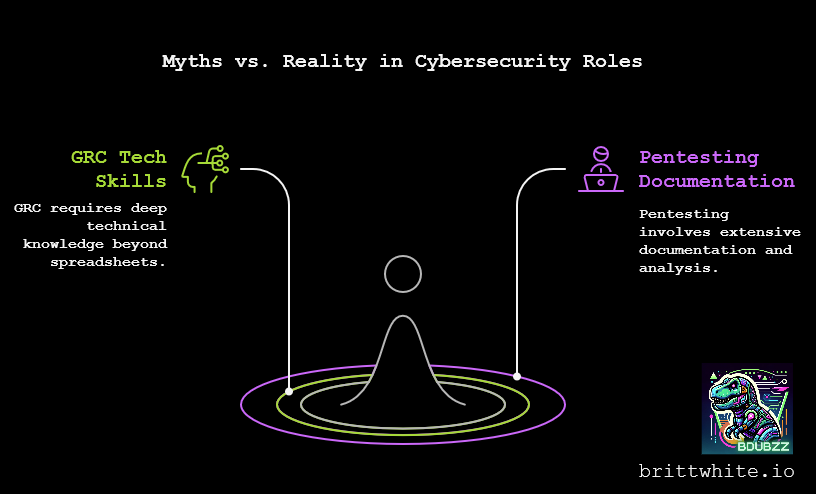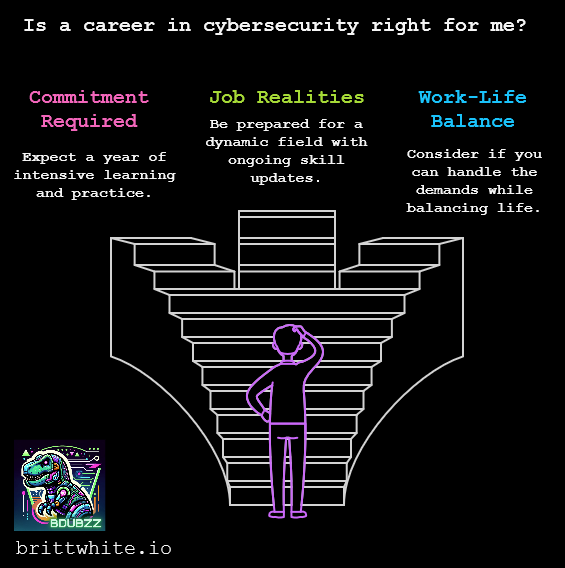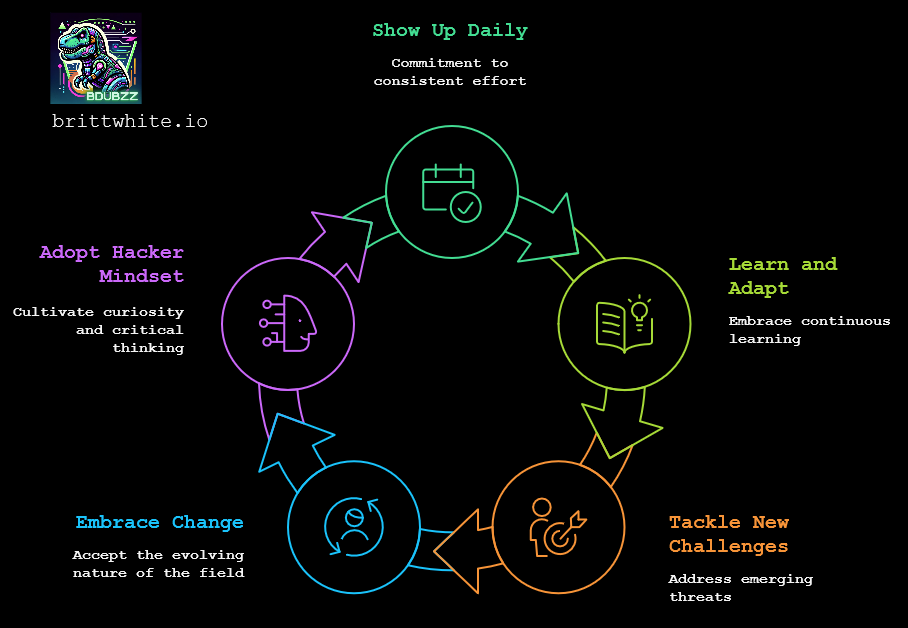Cybersecurity: What People Don’t Tell You!
Ready to cut through the hype about cybersecurity careers? From the hidden technical demands of GRC to the mountain of documentation in pentesting, here's the unfiltered truth about what it takes to thrive in this field.

You’ve seen the LinkedIn posts: cybersecurity pros raving about six-figure salaries, endless job opportunities, and the thrill of being a digital superhero. But the truth: behind every epic success story is a lot of grind, grit, and gallons of coffee.
So, let’s skip the sugarcoating and talk about the parts of a career in cybersecurity nobody tells you about—until you’re already knee-deep in logs and wondering what you signed up for.
Look, I'm not trying to scare anyone away from cybersecurity—it’s quite the opposite! But I believe in complete honesty: this field rewards passion and persistence, not just people hunting for a quick payday. Yes, the compensation can be excellent, but those dream offers? They come after you've put in the work, not before.
The Truth About GRC and Pentesting
Let's bust a couple myths that have been floating around our industry:
- GRC practitioners just shuffle papers and read policies all day
- Pentesters live in terminal windows and never touch documentation
Here's the real deal:
- GRC isn't just about spreadsheets. You need to understand the tech stack inside and out. How can you evaluate risks or craft meaningful policies if you don't know how the systems actually work? That CISSP isn't just for show, people!
- Pentesters aren't just terminal jockeys. You'll spend hours poring over tech documentation and writing detailed reports. Because randomly poking at systems without any context? That's not pentesting—that's just asking for trouble.
The secret sauce? These domains are two sides of the same coin. Whether you're writing policies or breaking into systems, you need both technical chops and analytical skills. Welcome to the beautiful world of cybersecurity!

The Reality Check: Breaking Into Cybersecurity
Let's get real for a minute—switching to cybersecurity isn't as easy as downloading a new app. It's more like training for a marathon while learning a new language... underwater. So many professionals make it look easy, but don’t be fooled by what you cannot see.
Most career-changers should expect to invest at least a year building their foundation. That means late nights wrestling with virtual machines, weekends deep-diving into networking concepts, and enough coffee to make your barista concerned. Could you do it faster? Sure, and I could also win a dance-off against a professional break dancer. Possible? Yes. Probable? Let's not kid ourselves.
Are you ready for the plot twist? Landing that first job isn't your "happily ever after" moment. It's more like the season finale that sets up an even more intense next season. The cybersecurity landscape is a moving target—today's must-have skill might be tomorrow's outdated tech. Staying sharp isn't just a bonus—it's a must.
If you're hoping for a 9-to-5 where you can leave work at work and binge Netflix without thinking about zero-day vulnerabilities... well, I hate to burst your bubble, but this might not be your jam.

The Truth About Career Fit in Cybersecurity
Let's have a heart-to-heart moment: cybersecurity isn't everyone's cup of coffee (or tea, if you're feeling fancy). And that's perfectly fine.
Some people dive into this field and absolutely crush it. They live for the thrill of hunting threats, get excited about new vulnerabilities, and genuinely enjoy the constant learning curve. Others discover it's about as comfortable as wearing wet socks.
The beauty of cybersecurity is it’s like a massive digital playground. If threat hunting isn't your thing, maybe GRC is. If incident response keeps you up at night (and not in the ‘I love this challenge’ way, but more in the ‘I’m rethinking my entire life choices’ way), it’s okay to explore other roles in security—or beyond. And if you explore all these paths and still feel like you're trying to fit a square peg in a round hole? That's okay too.
The real power move isn't forcing yourself into cybersecurity because it's "so hot right now”—it's finding your true professional passion, whether that's in security or somewhere else completely. Trust me, your career will thank you for the honesty.
The Hard Truth About Quick-Fix Bootcamps
We've all seen those flashy promises plastered across social media:
🚫 "From zero to six figures in cybersecurity in only 90 days!"
Betting your career on a quick-fix bootcamp is like setting your network password to password123—technically possible, but it’s not going to end well. The only people consistently making six figures in 90 days are the ones selling these programs.
Look, I get it. The allure of a fast track to success is tempting. But cybersecurity isn't a sprint—it's an ultramarathon. Could someone land a high-paying role quickly? Sure, and sometimes pigs fly. But betting your career on that chance is like implementing security controls without testing them first: risky and potentially catastrophic.
Real skill development takes time, hands-on practice, and yes, plenty of failures along the way. While certifications are valuable tools in your arsenal, they're not magical "hire me" tickets. The industry needs professionals who've put in the work, not just collected badges like Pokemon.
The Gritty Truth: It's Hard, But Worth It
Let's cut to the chase—cybersecurity isn't for the faint of heart. You'll spend countless hours diving into log files, staying up late scouring hundreds of pages of documentation, and explaining to executives why that "small" security request actually needs a six-figure budget.
But here's the thing: it's also ridiculously rewarding.
- You're literally fighting digital crime: stopping attackers, protecting data, and maybe even saving someone's life savings from that next sophisticated scam.
- The field is wildly diverse: whether you're a code warrior, a policy guru, or somewhere in between, there's a cybersecurity role with your name on it.
- When you find your groove, you may catch yourself reading the NIST documents for fun and actually enjoying those 3 AM incident response calls (okay, maybe not the 3 AM part).
Fair warning though: this isn't your typical "clock in, clock out" career. But for the right person? It's like finding your professional soulmate—challenging, exciting, and absolutely worth the journey.
The Bottom Line
Cybersecurity isn't your typical tech career path. It's not about wearing cool hoodies and dramatically typing on keyboards (although that part is fun). It's about being part of something bigger—protecting people, data, and organizations from real threats. You could be an integral part of building a more secure future.
Whether you're just curious about this field or already knee-deep in packets, remember this: success here isn't about overnight transformations. It's about consistently showing up every day, ready to learn, adapt, and tackle whatever new challenges emerge. Because trust me, there will always be new challenges.
This world never stops evolving—and neither should you. If you're truly passionate about this work, that constant change isn't a challenge; it's a feature. So, keep hacking, keep learning, and remember: progress beats perfection, every time.
In cybersecurity, your real secret weapon isn’t just a technical know-how—it’s adopting a hacker mindset: staying curious, thinking critically, and embracing the chaos with a sense of humor. Do that, and you won’t just survive—you’ll thrive.

P.S.
Did my blog save you from dropping your life savings on a sketchy bootcamp? Then why not subscribe—it's 100% free! While donations and paid tiers are available to support my work, I promise to keep all content accessible to everyone. No paywalls, no upsells—just authentic, no-BS guidance from someone who's been in your shoes.
